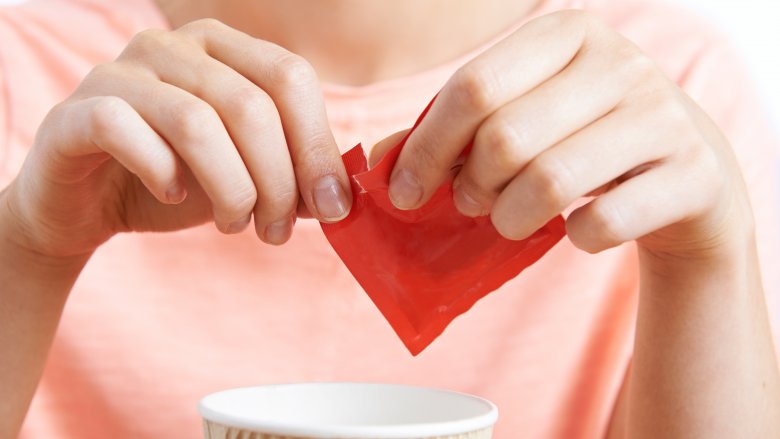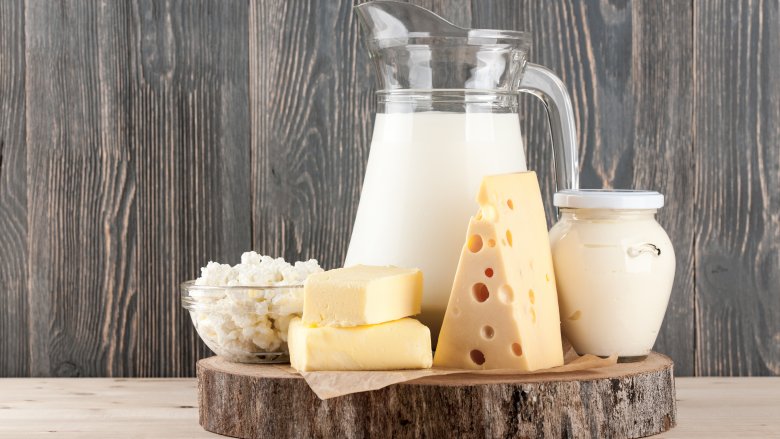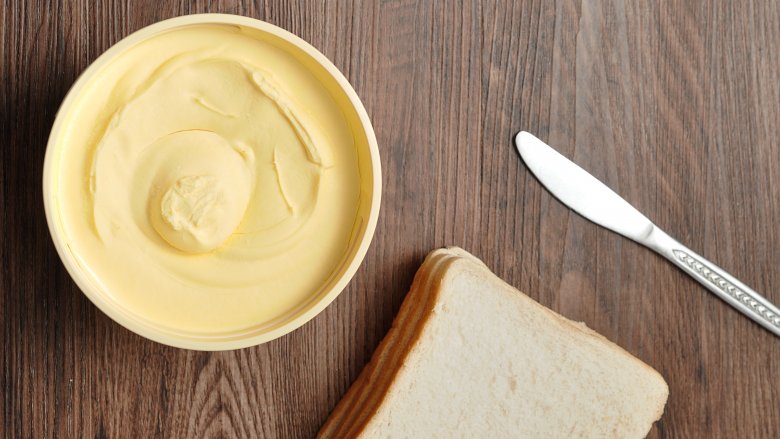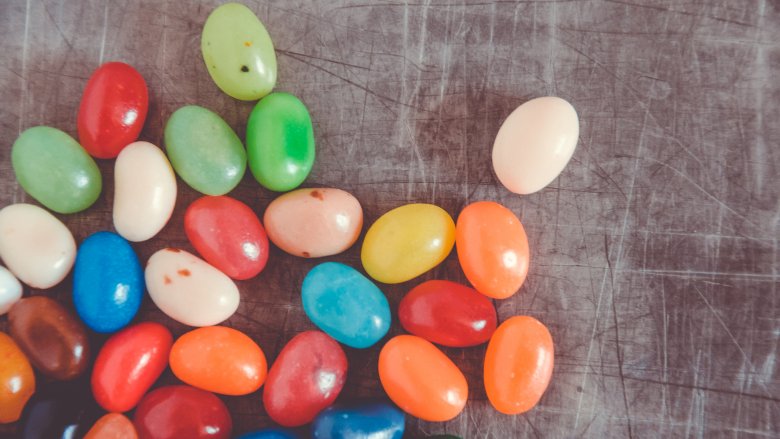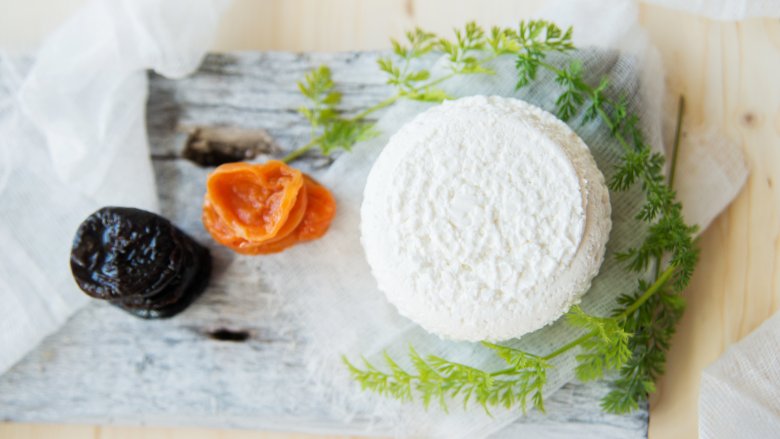Foods To Avoid For A Long Life
I don't often like to think of any foods as being strictly off limits in my diet. If I want to enjoy a bowl of ice cream on a hot summer day, then I want to feel like I can do that. And if I want to have a few cookies around the holidays, then by all means, I'm going to let myself. With that said, it's safe to assume that most, if not all of us, are looking to live long and healthy lives — which means we need to be paying attention to the foods we put into our bodies.
We all know it's ideal to consume whole un-processed food as much as possible, but which exact foods may be harming our health? I turned to the experts to help determine the foods we should try to avoid most of the time in order to give us the best chance at a long and healthy life.
Processed meats
Across the board, each of the experts I spoke to named processed meats as one of the top foods to avoid. Processed meats are often cured, smoked, and pumped full of sodium or other preservatives as a way to extend shelf life. The most common forms of processed meats we know and likely also love include bacon, sausage, hot dogs, salami, and cold cut lunch meats.
Jennifer Clemente, a board certified and clinically trained nutritionist told me, "Over consumption [of these foods] changes the composition of the gut micro biome leading to imbalances that can shift the body towards chronic inflammatory conditions." She went on to add that the World Health Organization has currently classified these kinds of processed meats as carcinogenic. I don't know about you, but as much as I love bacon, Meatless Monday is sounding like a pretty good alternative right about now.
Artificial sweeteners
While we may know it's important to limit our sugar intake, many seem to think turning to artificially sweetened varieties of their favorite foods or beverages are a healthier option. Not so fast!
Dr. Scott Schreiber, a chiropractic physician who is double board certified in clinical nutrition and rehabilitation told me, "Artificial sweeteners have been implicated in diabetes, neurological decline, liver problems, etc." He went on to add that these chemicals trick the body into believing it is consuming calories and when it realizes it hasn't, it triggers sugar cravings that lead to additional health issues.
"Artificial sweeteners are shown to trigger dysbiosis or imbalance of the protective bacterial levels of the gut micro biome," Clemente added. "Studies show levels of helpful strains like Lactobacilli and Bifidobacteria are decreased while less helpful strains Bacteroides are increased. These types of shifts can contribute to imbalances in the body linked to many of today's chronic health conditions such as inflammation, obesity, cancer and even autism."
Dairy products
I have not only been severely lactose intolerant the majority of my life, but I also used to sing in a choir, so dairy has almost always been something I either severely limited or completely avoided in my diet. Turns out, it's something we all need to be more mindful of consuming.
"Dairy products contain saturated fat, sugars, hormones, and antibiotic residues that are not good for your health," said Schreiber. "It is a digestive system irritant, contributes to heart disease, diabetes, acne, and weight gain." Schreiber went on to add that due to the production of insulin-like growth factor, it has been implicated as a cancer promoter.
While this is one perspective, it's important to keep in mind that the science around dairy's nutritional harm and/or benefit is unclear. David Katz, M.D., director of the Yale-Griffin Prevention Research Center in Derby, Connecticut, told Self that the science is "murky at best." Lisa Sasson, R.D., a clinical associate professor of nutrition at New York University, was interviewed in the same Self article, and said that she could find just as many studies that claim dairy can help prevent cancer.
Some may feel it's better to be safe than sorry, while others aren't willing to give up their beloved cheese if the science isn't yet clear. If you're unsure, it's always safest to just do what feels right for you.
Soda
Whether you call it soda, pop, or coke, the important takeaway here is that consuming these types of sugary beverages are not conducive to living a long and healthy life. Dr. Candice Seti, a licensed clinical psychologist, certified personal trainer, and certified nutrition coach, also known as The Weight Loss Therapist, told me, "Drinking soda is basically like drinking simple sugar combined with chemicals. Because of the simple sugars, it causes a rapid insulin response (with a blood sugar spike) followed by the obvious crash soon after."
She went on to add that if this cycle is happening regularly, it will often lead to insulin resistance, metabolic syndrome, and diabetes. Seti also pointed out the link between drinking soda and dementia, gout, increased cancer and heart disease risk, and obesity.
Obviously water is always going to be the best beverage to stay hydrated and quench your thirst, but if you're drinking soda for the bubbles or flavor, Seti suggests replacing it with seltzer. And if you're drinking soda for the caffeine, coffee or tea would make great substitutes.
Fried foods
As delicious as french fries, onion rings, and corn dogs may be, it's safe to say we all know these foods are not the poster children of a healthy diet. Becky Kerkenbush, a registered clinical dietitian at the Watertown Regional Medical Center told me, "Fried foods are high in unhealthy fats (saturated and trans fats)."
While saturated fat is commonly found in many animal sources, including fatty beef, lamb, pork, and butter, it is also found in many plant-based oils, which are used in the process of frying foods, such as palm oil, palm kernel oil, and coconut oil.
Instead of hitting up your favorite drive-thru the next time a hankering for your favorite fried food hits, Kerkenbush suggests baking your own french fries and chicken nuggets right at home.
High sodium foods
Like most, my college days were full of cheap and convenient meals like packaged ramen noodles, boxed rice, and TV dinners. Of course I knew these weren't the healthiest options out there but they fit my budget and were easy to have on hand when I couldn't make it to the school cafeteria before it closed for the night. Kerkenbush pointed out that these foods are high in sodium and low in nutrients. A diet high in sodium can be a contributing factor leading to high blood pressure, stroke, heart disease, and heart failure.
"When possible, select low-sodium or reduced-sodium versions of these items," she suggested, "but still remember that they may be higher in sodium than what is recommended." She also pointed out that portion control can be difficult with these kinds of items, often leading someone to consume more calories than they even realize.
Trans fats
While some fats can serve multiple benefits to our bodies, Seti pointed out that trans fats do just the opposite. "Trans fats are basically vegetable oils that have added hydrogen molecules to change them from a liquid to a solid and ultimately created a longer shelf life," she said. A great example of this is Twinkies, which basically last forever. "The problem with this is that this altered state is hard for the body to break down and so it just hangs out in the fat tissues and actually prevents us from using other proteins and fats," Seti added.
We often find these fats in commercially made food products like biscuits, cakes, fried fast foods, microwavable frozen foods, and margarine. "While you may think these foods are tasty," said Clemente, "trans fats may increase your risk for cardiovascular disease, stroke, and Type 2 diabetes."
Seti suggests checking your nutrition labels before you purchase and avoiding anything with trans fat, hydrogenated, or partially hydrogenated anything listed on the ingredient list.
High fructose corn syrup
The debate around high fructose corn syrup has been floating around for awhile as it is a cheaply manufactured and easily accessible manmade sweetener often found in processed foods and sodas. While it is used quite a bit, its impact on our bodies is actually quite negative.
"The problem with high fructose corn syrup is the way it impacts our hunger and satiation hormones," said Seti. "Ghrelin is our hunger hormone and leptin is our satiation hormone and high fructose corn syrup messes with both of them!"
She went on to explain that fructose, unlike glucose (sugar) does not actually stop ghrelin and tricks the body into blocking leptin so despite having eaten, we continue to stay hungry and never actually feel full. I'm sure you can see how this can be a good thing for the food companies but not such a good thing for our waistline or our health.
Low fat alternatives
If we need to avoid trans fats, and also be mindful of the saturated fat found in fried foods, then opting for lower fat alternatives must be a good solution, right? Wrong. Fats are an important part of a healthy, balanced diet, but Seti pointed out that when the fat is removed from these low fat products, they have to be replaced with something else.
"That 'something' can be sugar, artificial sweeteners, flavor enhancers, or even trans fats," she said. "All of these things ultimately make the food item less healthy than its full fat original!" Seti went on to add that eating behavior studies have shown that people tend to eat up to 50 percent more when opting for these low fat products, so she suggests enjoying healthy fat foods like nuts, seeds, fish and avocado.


